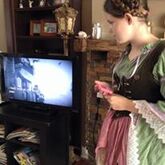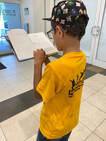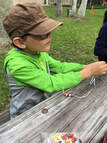|
Talking About
Florida Homeschooling... Evaluations and More |
A good evaluator works for the parents, assisting them in meeting legal requirements and in supporting them when districts overstep their bounds." |
A: A couple of decades ago, one child greatly affected my views on teaching children to read. This boy was about 8 or maybe 9 years old when his parents brought him to the tutoring company where I then worked as a full-time tutor. This boy was enrolled in a local public school but hadn’t yet learned to read. In fact, he didn’t even know the letters of the alphabet–he didn’t know their names nor their sounds. At least one expert at the school had told the parents that he was ineducable and would never learn to read. The special education department at the school was no longer trying to teach him to read because they’d deemed this young man a lost cause. He’d suffered brain damage at birth when the umbilical cord wrapped around his neck and cut off oxygen to the brain. Then, four years later, he suffered further brain damage when he was hit by a car. The experts were sure that he couldn’t manage to learn to read (even though he had learned to walk and talk).
This young man’s parents brought him to our company because they wanted someone to try. They wanted to know that they’d done their best to teach their son as much as he was capable of. They knew they might be asking the impossible, but they were willing to spend the money anyway; they wanted the peace of mind that would come from knowing they’d done their best for their son’s education. As long as we gave it our best shot, they said they’d be satisfied. We didn’t use fancy methods or materials. We used the same instructional methods with him that we used with any other child. And they failed. We worked for an entire hour on one letter of the alphabet and its sound, but at the end of the hour, he didn’t get it. At the next tutoring session, we worked on the same letter, and he didn’t get it. At the next, we continued on the same letter and he still didn’t get it. But we’d used all of our materials for that letter, so we moved on to a new letter. The pattern repeated over and over: Every three days of working on a single letter ended with him not knowing any letters. Myself and the other tutors worked with him over the course of a few months. We worked through the entire alphabet and yet he still knew none of the letters. So, we started all over again. With the same methods and materials. And we worked through the entire alphabet, three tutoring sessions per letter, again. I was promoted and transferred to another location. Other tutors continued working with that boy, but I returned the next summer. My old location needed help during the summer and I was asked to fill in temporarily. And there was this young man. I sat down to work with him and saw that this time I’d been asked to use books with him, short books, but books without any pictures, books with only words. And he was reading them. The boy whom the school had deemed incapable of learning was reading sentences. At that moment, I realized that one of the secrets of teaching reading is to continue trying, to be patient and keep working, keep encouraging, keep teaching the sounds of letters and sight words, until the child is ready to learn them. Not all children are ready to learn at the same age. And that’s one of the problems with schools. They expect every child to be ready to learn to read at the same age, and some aren’t. And schools, despite what they may say, don’t do well with kids who don’t fit their schedule. They give up on too many of them. They can’t slow down and work at the child’s pace because they have a schedule to keep. They can’t mess up the schedule to wait for one child without holding everyone else back. They don’t have the personnel to work individually intensively with each child who’s not learning on the school’s schedule. In light of this, I would not recommend sending a child who didn't know how to read to a school to fix the problem. Not if the child had loving parents who were working to teach him to read. Even if he were eight years old and didn’t yet know the letters of the alphabet. If the parents feel incapable of teaching the child, I would recommend they hire a tutor to work with the child but not in a school setting with rigid time tables. I would recommend that parents who have been working at teaching their child to read keep working with the child, lovingly and patiently. I’d also recommend, even more, that the parents work on motivating the child because getting the child ready to learn is key. The child has to want to learn to read, has to see a reason for learning it. While the parent should teach the child the letters of the alphabet and their sounds (and then more advanced phonics about the sounds of combinations of letters and word families) as well as sight words (words to memorize), I’d say that working on motivation is just as important–if not more so. How can a parent work on motivating a child to read? There are a number of ways to tackle this. I highly recommend working on this in multiple ways simultaneously, rather than using a one-pronged approach. Encouragement is important. As phonics and sight words are being taught, act like a cheerleader. Use those acting skills to be bubbly and excited. Go wild with cheers, jump up and down, give high fives and stickers as the child learns about letters or sight words. Tell others excitedly about his progress, especially when you know the child can overhear you. (This will not only encourage the child, but might reassure the concerned relatives and friends as they hear about the child’s progress.) Bring home reading materials, lots of them. Go to the library and not only have the child choose books but pick others that the child might be interested in, too. Get books or magazines as presents (and cheer for them, make them sound like wonderful presents). Get books of stories, poems, and information. Choose a wide variety of types of reading materials. The more reading materials you have on hand, the more likely your child is to discover the kind of reading material that excites him and makes him want to learn to read. (And research shows that the biggest indicator of reading success is the number of books in a child’s home.) Read. Read to your child. Even after the child has learned to read, keep reading to the child. Read with the child. Read recipes as you bake together. Read directions as you put together toys or new furniture or science kits or whatever. Read adult books (or magazines or websites or whatever) yourself so the child sees that reading is something adults do. The more the child is surrounded by reading, the more the child will want to be included in it. Pick a word (or a letter if the child isn’t ready for a word) to point out regularly for a while. Start with words that are important to the child (such as a name of a loved one) or words that are common and make a game of finding them around you. Ask the child to read that particular word to you (with help, at first, as needed) when reading a story to the child. Do this often for a few days until the child seems to know that word. Then try adding on a new word to work on. Become too busy. Read stories aloud, stories that the child loves or is excited about, but then sometimes (not too often) get too busy to continue. Stop at an exciting part and apologize as you go off and do something else. You may have to try this a lot of times before the child will start to want to be able to read for herself when you won’t finish the story, but eventually this tends to cause the child to pick up the story and try to figure out what happens next. Go to events and activities that involve reading. Go to story times at the library or a bookstore. Go to celebrations of famous authors or their books. Play games that involve written words–whether board games or apps. Visit places related to stories read. Find ways to make reading seem more fun and active. And in the meantime, work on learning other things with your child, too. If the child is older than the average beginning reader, don’t keep the child behind because they aren’t reading yet. Read to the child about science and history. Read famous stories. Watch educational videos. Do experiments and projects. Work on arts and crafts. And tell the concerned relatives and friends about the great things the child is learning and doing so that they won’t focus overly much on the lack of reading skills. Suggest to concerned loved ones that they encourage reading, too, by reading with the child and getting books as gifts. Remind them that even in schools, there are lots of children who aren’t reading yet at this age despite the best work of teachers. Tell those people, excitedly, about the great resources you are using and the other homeschool parents and authors and such who are helping you figure this out–help them understand that you do have experts helping you even if the child isn’t in school. Some find that materials such as Teach Your Child to Read in 100 Easy Lessons or The Ordinary Parent's Guide to Teaching Reading can help teach reading skills. Or materials developed especially for children struggling in this include those based on the Orton-Gillingham approach such as the Logic of English, All About Reading, All About Spelling help a lot. Mostly, be patient and don't give up as you try to get your child to see a reason for wanting to read. Other issues... Of course, testing with a specialist such as an educational psychologist may help find learning issues that need to be addressed, and testing with an eye doctor may show other physical issues that need to be addressed. Hope this helps, Cheryl Trzasko
1 Comment
Simonee Cooper
2/9/2023 07:41:34 am
I love this! My 9 year old is a slow reader. As in some days yes and some days ohhh! Sometimes I think it is her personality and if she wants to do it. I see what a strong leader she can be. She loves art and Math and Science experiments. I feel like she had a bad experience with it in kindergarten and is very shy to do it, like she is being judged. But I know one day soon she will just take off with it. Funny because she asked me to get her ( big girl)chapter books ...so here we go:)
Reply
Your comment will be posted after it is approved.
Leave a Reply. |
Archives
April 2024
Categories
All
|

 RSS Feed
RSS Feed







